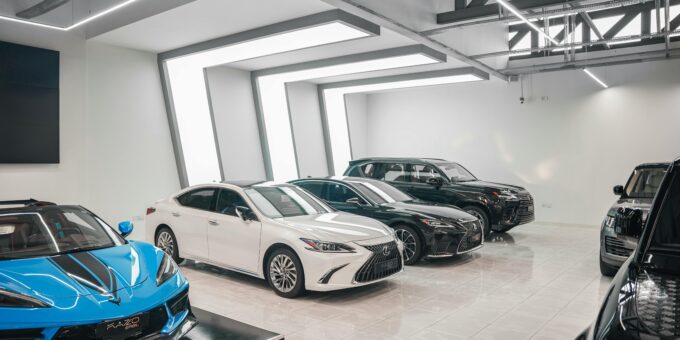
Luxury cars are known for their comfort, and climate control is a big part of that. But heating and cooling systems are notorious for draining energy, especially in electric vehicles. AI steps in as a smart climate manager, reducing unnecessary energy use while keeping the cabin comfortable.
By learning passenger preferences and external weather conditions, AI can pre-condition the cabin before the journey even starts. For instance, if the car knows it’s parked in the sun, it can ventilate the interior before you enter, reducing the need for full-blast air conditioning later. Similarly, in colder climates, AI warms only the occupied seats and directs airflow strategically, minimizing battery drain.
This smart approach helps save fuel in hybrids and extends range in EVs, proving that luxury does not have to come at the cost of efficiency.
AI in Battery Management Systems
Battery management is the heart of every electric luxury car. Unlike standard systems, AI-enhanced battery management systems (BMS) continuously analyze temperature, charge levels, and usage patterns to optimize performance.
AI predicts the best charging cycles to extend battery life, preventing overcharging or deep discharges. It also monitors the health of individual cells, redistributing energy when needed to maintain balance across the pack.
For luxury EVs like the Mercedes-Benz EQS and BMW i7, this means not only longer range per charge but also a battery that stays healthier for years, protecting the long-term investment of owners.
Predictive Maintenance for Efficiency
Unexpected breakdowns or inefficiencies can waste significant amounts of energy. AI predictive maintenance minimizes these risks by monitoring every component of the car in real time.
From tire wear to engine efficiency, AI identifies small inefficiencies before they become major issues. For instance, detecting low tire pressure early prevents increased rolling resistance, which otherwise reduces fuel efficiency and range. Similarly, early warnings about drivetrain friction can save both energy and repair costs.
In luxury cars, predictive maintenance also integrates with service centers, scheduling appointments automatically and ensuring owners experience minimal inconvenience.
Driver Behavior Analysis
No matter how advanced the technology, the driver still plays a huge role in efficiency. AI provides real-time feedback on driving habits, coaching owners to adopt smoother acceleration, steadier speeds, and less aggressive braking.
Luxury cars, with their powerful engines, tempt drivers to push harder on the pedal. AI balances this by offering “eco-driving modes” that subtly encourage fuel-efficient driving while still maintaining performance. Some systems even gamify efficiency, rewarding drivers with scores for efficient trips.
This combination of human behavior and AI assistance makes a measurable impact on both fuel economy and EV range.
Luxury EV Range Anxiety and AI Solutions
Range anxiety—the fear of running out of charge—is one of the biggest barriers to EV adoption. Luxury automakers use AI to ease this concern by predicting energy consumption and locating charging stations along the route.
AI not only identifies nearby stations but also checks availability, estimated waiting times, and even suggests optimal charging stops based on your schedule. This creates a stress-free driving experience, allowing drivers to focus on comfort and performance rather than constantly monitoring the battery gauge.
Brands like Tesla and Porsche have already integrated AI-driven navigation to mitigate range anxiety, setting the standard for others.
AI in Aerodynamics and Design
Every curve and surface of a luxury car affects its efficiency. Traditionally, aerodynamics relied on wind tunnel testing, but now AI is revolutionizing design. By running millions of simulations in virtual environments, AI fine-tunes the body shape to reduce drag without compromising aesthetics.
Active aerodynamic components, such as adaptive grilles and retractable spoilers, are also controlled by AI. They adjust automatically depending on driving speed and conditions, balancing performance with efficiency.
This integration of AI in aerodynamics allows luxury cars to glide more efficiently, reducing fuel consumption and improving EV range.
Smart Tire Pressure Monitoring
Tires are one of the simplest yet most overlooked factors in efficiency. Underinflated tires increase rolling resistance, causing both higher fuel consumption and reduced EV range.
AI-powered tire pressure monitoring systems (TPMS) go beyond basic alerts. They predict leaks, analyze wear patterns, and recommend optimal inflation levels based on driving conditions and load.
For luxury cars, this means not just safety but also a subtle yet consistent boost in efficiency, ensuring every mile is as smooth and economical as possible.
Integration of AI with IoT
Luxury cars are no longer standalone machines; they are connected ecosystems. AI integrates with the Internet of Things (IoT) to create smarter mobility solutions.
Imagine your car communicating with your smart home to preheat the garage, or syncing with your calendar to plan efficient routes. AI and IoT together optimize charging schedules based on electricity tariffs, ensuring you charge at the cheapest and most sustainable times.
This connected lifestyle enhances convenience while quietly improving fuel efficiency and EV range.
AI and Self-Driving Luxury Cars
Autonomous driving is not just about safety—it’s about efficiency too. Self-driving AI systems maintain steady speeds, reduce idling, and optimize acceleration better than most human drivers.
For EVs, this translates into significant range extensions, as the car conserves energy by avoiding aggressive driving. In hybrids and fuel-powered luxury cars, autonomous systems minimize fuel wastage in stop-and-go traffic.
As self-driving technology matures, luxury car owners will experience not only hands-free convenience but also maximum energy efficiency.
You Can Also Read : How to Apply AI for Predictive Maintenance in Premium Vehicles
Case Studies in Luxury Brands
Several luxury car brands are already showcasing AI-driven efficiency improvements:
-
Tesla Model S Plaid uses AI to optimize battery usage and regenerative braking.
-
Mercedes-Benz EQS integrates predictive navigation that accounts for charging stops.
-
BMW i7 employs AI climate control to reduce HVAC energy waste.
-
Audi e-tron GT combines AI with aerodynamics for range optimization.
These examples highlight how luxury automakers use AI not as a gimmick but as a core part of their energy strategies.